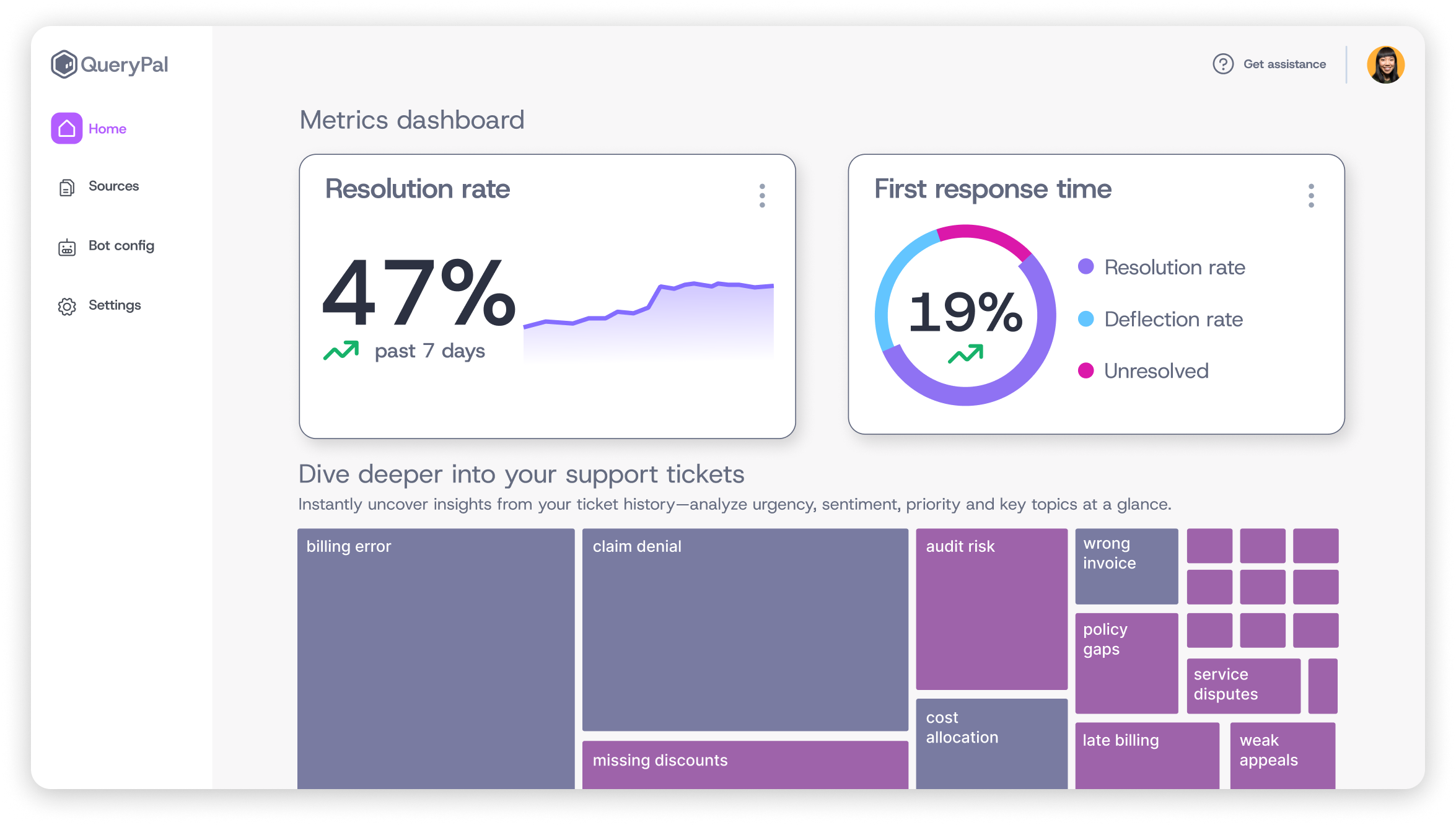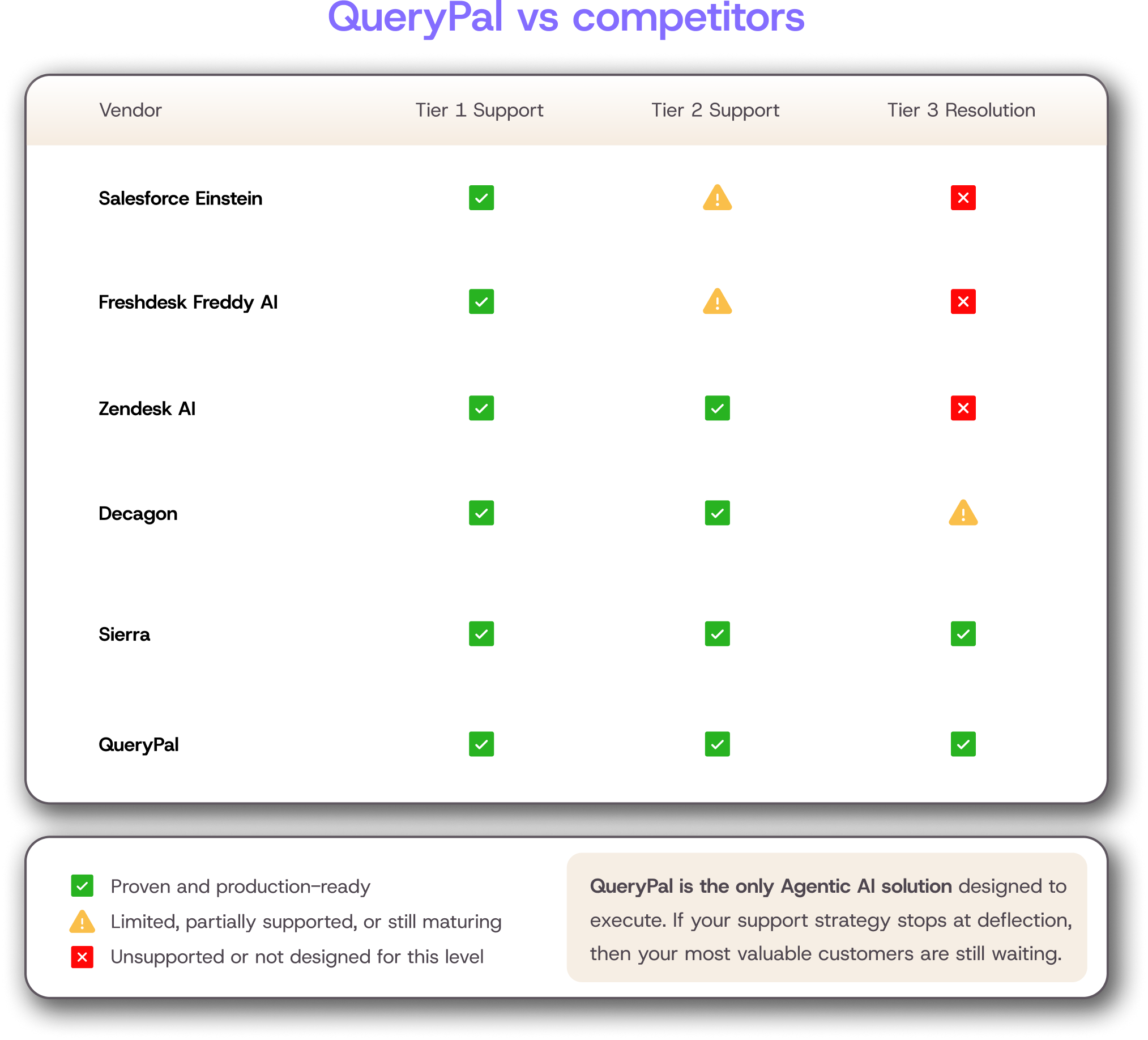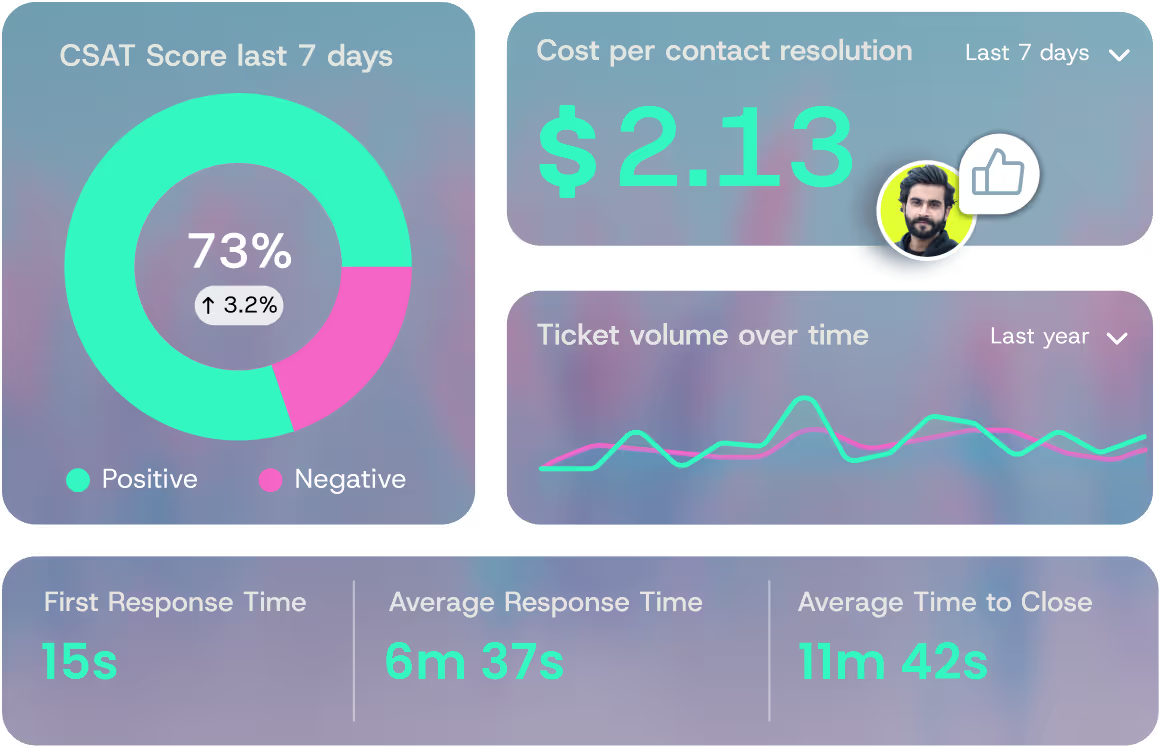The 10 Best Ada Alternatives & Competitors in 2026
Is your legacy chatbot starting to show its age like a flip phone at a tech conference?
Ada's been around for years as the go-to AI customer support platform, but tech moves fast, and what worked in 2023 doesn't cut it anymore.
More companies are looking for AI solutions in customer service that don't just answer questions, but solve problems without constant human hand-holding. [1]
Whether you're frustrated with Ada's rigid deployment rules or just window shopping for something better, there's a whole new generation of AI platforms worth checking out.
Let's dig into what Ada does right, where it stumbles, and why one of these ten alternatives might be exactly what you need.
Key Takeaways
- Ada's got solid voice tech and enterprise security, but it's not great at handling complex support issues or giving you control over where it runs.
- New platforms like QueryPal are stepping up with smarter AI that works on its own and integrates well with your existing knowledge base.
- You'll want to choose your next platform based on how many tickets you want to eliminate, what security hoops you need to jump through, and which other tools it needs to work with.
What is Ada, and Why Look for Alternatives?

Ada's been on the customer service AI scene since 2016, doing what it does best: handling voice bots and sending out automated messages to customers.
It's helped plenty of big companies cut down on support calls, but there's a catch.
First, you'll need deep pockets to get in the door, since they're strictly playing in the enterprise sandbox. Smaller businesses may be priced out.
The platform is good for voice automation and can keep your support team from drowning in basic requests, but Ada often can't handle the bread-and-butter questions about accounts and common problems that make up 80% of tickets.
If you've got your company knowledge spread across different systems (who doesn't?), Ada may not play nice with all of them. And for companies that need to keep their data tightly locked down, Ada's cloud-only setup might be a deal-breaker.
Finally, support teams are starting to look at the numbers that matter, like how many tickets they can solve without human help, or whether their AI can think for itself instead of just following scripts. Some teams (especially those dealing with strict data rules) are finding out that newer platforms might be a better fit for how support works in 2026. [2]
Ada's Strengths and Limitations
Ada spent years getting voice technology down pat.
When customers call in, the system understands them without those awkward "please repeat that" moments we've all suffered through.
Big corporations jumped on board, because Ada provided serious security.
But the limitations show themselves pretty quickly: simple problems that should be no-brainers, like password resets or checking account balances, still need humans to jump in.
This is where understanding what customer service transformation really means becomes crucial - it's not just about adding AI, but fundamentally changing how support operates.
And truly high-security organizations like banks and hospitals can't even consider Ada because they need all their software running on their own computers.
Another major issue is trying to get Ada to work with other tools. Help articles sitting in Google Docs or detailed guides in Confluence might as well not exist.
Meanwhile, other companies have AI that's practically running the whole support show by itself, complete with charts showing exactly what's working and what's not.
For teams watching their budgets and trying to help customers faster, Ada is starting to look like yesterday's news.
What to Look For in an Ada Alternative

Shopping for new AI support software is a bit like buying a car: you need to know what's under the hood before signing anything.
Basic Considerations
Most support teams need their AI to handle three levels of help: basic stuff like "where do I find this button," account problems like "why isn't my payment working," and the tough stuff that needs special attention. The best platforms take care of those first two levels, leaving your human agents free to handle the third. Advanced customer support automation should be able to identify and route these different issue types automatically.
These days, you shouldn't have to spend weeks teaching chatbots every little issue they need to know. Modern AI will problem-solve on its own, sorting tickets, confirming that someone is who they say they are, and getting work done without hand-holding.
Cloud software has a lot of benefits, but some companies need to keep their software and data inside their own buildings. Your new platform should give you that choice.
Ecosystem Integration
Nobody wants to rebuild their entire tech setup just to add new software. Your AI needs to work with whatever help desk you're using, whether that's Zendesk, Freshdesk, or something else.
It should also pull answers from wherever your team keeps their documents: Google Drive, SharePoint, or those endless Confluence pages nobody remembers to update.
These days, customers expect help available anywhere, anytime. Good platforms work through Slack, Teams, and even phone calls. Some people still prefer talking to typing, and your AI should seamlessly handle both.
Compliance and Security Standards
Security can't be an afterthought. Your choice here impacts your overall risk profile and customer trust.
Look for compliance with SOC 2 Type 1 and 2, GDPR, ISO 27001, HIPAA, and FedRAMP where relevant.
Self-hosted deployment options often help meet stringent data residency rules, reducing risk of external data leaks. Also consider whether the platform offers hybrid models that balance SaaS convenience with enterprise-grade protection.
Top 10 Ada Alternatives in 2026
As customer support automation evolves, Ada is no longer the only strong option. In 2026, several platforms offer better flexibility, transparent pricing, and stronger compliance, making them worthy alternatives.
1. QueryPal
QueryPal goes beyond ticket deflection by autonomously resolving complex support issues through deep CRM and billing integrations, cutting costs up to 60% while ensuring SOC 2 and GDPR compliance. The platform's Concierge agentic AI chatbot handles complex customer queries autonomously, while the Intercept AI for ticket and email deflection prevents issues from even becoming tickets in the first place.
Why it matters: Faster resolutions mean happier customers and leaner operations, without risking sensitive data.
Highlights:
- Concierge AI that autonomously resolves issues without human intervention
- Advanced Prism enterprise analytics with treemap visualizations for workflow insights
- Operates within your infrastructure for complete data security
- SOC 2 and GDPR compliant, ideal for AI customer service in financial services and other regulated industries
- Integrates with Slack, Teams, Notion, Google Docs, Confluence, StackOverflow, YouTrack
- Real-time indexing ensures AI always has current knowledge
- Self-hosted deployment option on AWS for maximum control

2. Sierra.ai
Sierra.ai delivers voice support and outbound messaging with rapid no-code setup, ISO 27001 certification, and task automation, helping teams scale without the heavy lift of constant manual upkeep. For teams evaluating options, our guide to Sierra.ai alternatives provides additional context on how different platforms compare.
Why it matters: Organizations save time and resources while ensuring enterprise-grade security.
Highlights:
- Voice support and outbound messaging
- No-code customization for quick deployment
- ISO 27001 certified
- Low-configuration agentic AI automation
3. Decagon.ai
Decagon.ai provides transparent dual-pricing and HIPAA compliance, making it a reliable choice for healthcare and e-commerce teams needing secure, scalable integrations across Shopify and Microsoft Teams. If you're considering Decagon, you might also want to explore other Decagon alternatives and competitors to ensure you're making the best choice for your specific needs.
Why it matters: Flexible pricing and healthcare compliance expand adoption across regulated industries.
Highlights:
- Transparent dual-pricing model
- HIPAA compliant for healthcare teams
- Shopify and Microsoft Teams integrations
- Suited for healthcare and retail use cases
4. Moveworks
Moveworks combines HIPAA and FedRAMP compliance with Teams integration, a voice bot, and email drafting tools that lighten workloads by automating repetitive communication for enterprise-scale support.
Why it matters: It enables secure, enterprise-grade automation that boosts agent efficiency.
Highlights:
- HIPAA and FedRAMP certified
- Microsoft Teams integration
- AI-powered voice bot
- Email drafting playground for agents
5. Kommunicate
Kommunicate offers accessible pricing near $10,000 annually with a smooth bot-to-human handoff and omnichannel presence, supporting a variety of LLM providers for tailored implementations.
Why it matters: Budget-friendly, enterprise-ready automation is no longer out of reach.
Highlights:
- Transparent, usage-based pricing (~$10k/year)
- Best-in-class human handoff system
- Omnichannel support coverage
- Plug-and-play with multiple LLM providers
6. Intercom (Fin)
Intercom's platform includes Fin, an AI chatbot with customizable flows, 400+ app integrations, and $99/seat pricing, blending clarity, flexibility, and analytics-driven customer support.
Why it matters: Teams gain predictable costs and scalable AI support in one platform.
Highlights:
- $99/agent seat-based pricing
- Supports 400+ app integrations
- Customizable chatbot conversation flows
- Detailed analytics for optimization
7. Zendesk AI
Zendesk AI strengthens its support with Ultimate.ai's workflow automation, all tied into Zendesk's familiar ticketing dashboard for customers already invested in its ecosystem. However, many teams are now exploring Zendesk alternatives that offer more flexible deployment options and better autonomous resolution capabilities.
Why it matters: Seamless integration reduces friction and accelerates ROI for existing Zendesk users.
Highlights:
- Unified dashboard with ticketing
- Native Zendesk integration
- Enhanced by Ultimate.ai acquisition
- Streamlined workflow automation
8. Forethought
Forethought emphasizes measurable ROI with AI that learns from past tickets to automate resolution and improve customer outcomes, backed by strong G2 ratings.
Why it matters: Teams can rely on proven outcomes validated by customer success stories.
Highlights:
- Learns from historical ticket data
- Ticket deflection and automation
- G2-validated customer success record
- ROI-focused positioning
9. Freshchat by Freshworks
Freshchat balances affordability and enterprise features with pricing from $47/month, robust notifications, and a strong integration ecosystem ideal for SMBs scaling their support.
Why it matters: It makes modern support tools accessible without enterprise-level spend.
Highlights:
- Pricing starts at $47/month
- Reliable notification system
- Wide integration ecosystem
- SMB-friendly entry point
10. Tidio
Tidio provides SMBs with a free tier and $29/month plans, offering e-commerce-focused features like cart recovery, discount automation, and easy no-code setup.
Why it matters: Smaller teams gain automation power without needing technical expertise.
Highlights:
- Free tier plus $29/month plans
- Cart recovery and discount automation
- No-code setup for quick adoption
- Optimized for e-commerce use cases
Comprehensive Feature Comparison Matrix
When we compare these platforms, a few things stand out.

QueryPal is unique in offering self-hosted deployment on AWS, enabling organizations to keep data in-house. It supports a wider range of knowledge sources like StackOverflow and YouTrack, which many others don't. The platform's visual analytics through its Prism system offers treemap visualizations and deeper insights than simple dashboards. QueryPal's Intercept AI prevents tickets from being created in the first place, while the Concierge AI resolves complex issues autonomously - a dual approach that significantly reduces support workload.
Sierra.ai and Moveworks bring advanced certifications like ISO 27001 and FedRAMP, appealing to sectors demanding rigorous security. Platforms like Kommunicate, Freshchat, and Tidio provide transparent pricing and ease of use, ideal for fast-growing SMBs.
How to Choose the Right Ada Alternative
Support teams need to identify their specific pain points: maybe the phones won't stop ringing with basic questions, or they spend too much time copy-pasting answers.
Or maybe you're a small business with people serving double- or triple-duty, and they dream of AI handling most customer service requests from start to finish so they can keep up with their many other tasks.
Each problem needs its own fix, and not every platform delivers the same way.
Some teams need to build their own connections between systems, so you'll need a platform that has good APIs and can send automatic updates when things happen. Think about where your team keeps their answers (probably scattered across three different places) and whether customers need help on phones, chat, or both.
Return on investment is very crucial. Add up what you'll spend getting started, monthly costs, and how much you'll save when the AI takes over the boring stuff. Smart teams count everything: faster answers, fewer mistakes, and all those hours agents get back.
For Enterprises Requiring Maximum Control
Some companies can't let their data leave the building, period. QueryPal gets this and lets you run everything on your own computers. With its self-hosted deployment option and comprehensive suite of AI tools - from the Intercept system that deflects tickets before they're created to the Concierge AI that autonomously resolves complex issues - QueryPal provides enterprise-grade capabilities while maintaining complete data sovereignty. The platform's Prism analytics dashboard gives you full visibility into how your AI is performing, all while keeping your data secure within your own infrastructure.
If you're dealing with government rules or medical records, take a look at Moveworks or Sierra.ai. They've jumped through all the right hoops to keep auditors happy and data locked down tight.
For Fast-Growing SMBs
Small businesses need an AI platform that fits their budget and grows with them. The most practical options are those with clear pricing and free trials.
Most support teams can connect these tools to their help desk and be up and running within a few days, without outside developers.
Implementation Roadmap
Switching to a new customer support system takes planning. On average, support teams need about three months to get everything running smoothly.
- Month one: Connect the AI chatbot to your help desk and make sure basic workflows operate correctly.
- Month two: Upload your knowledge base, training documents, and resources stored in tools like Google Docs.
- Month three: Train your support team and update customers on the changes.
Your help desk should come first, since it's the center of all customer support activity. Once that's up and running, you can connect your knowledge base and internal chat tools. A smart move is involving your agents early, since this is where an AI agent working in real time can add value by reducing repetitive work.
Future-Proofing Your Selection
Customer support technology moves fast. The right choice should handle today's needs while preparing for tomorrow.
Look for vendors building AI agents that operate in real time, tools that use historical data for better predictions, and features that support multiple languages as you expand.
Also, check stability before you commit. Look at customer adoption, funding, and how often new features roll out. Choosing a platform with a solid long-term vision ensures consistent operation and a stronger customer experience over time.
Wrapping Up
Choosing a customer support AI platform means balancing automation, control, compliance, and cost. Ada has its place, but doesn't cover every use case.
Platforms like QueryPal bring fresh approaches with self-hosted deployments and agentic AI, reducing human handoffs and boosting customer satisfaction. As support teams face growing demands, these alternatives offer a range of options to fit diverse needs and budgets.
We encourage you to explore these platforms thoughtfully, matching features to your unique environment and goals. The right choice will not just automate but transform your customer experience for years to come. Book a demo with QueryPal to see how it can fit your needs.
References
Read more
Activate your free
6 week trial
& white-glove integration support.
Cut support costs by 60%, slash response & resolution times, improve your customer experiences, & reduce agent burnout. Find some time with us to show you how.

